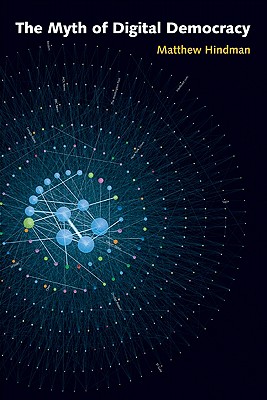

 Princeton University Press
Princeton University Press
The Myth of Digital Democracy


Key Metrics
- Matthew Hindman
- Princeton University Press
- Paperback
- 9780691138688
- 9 X 6 X 0.9 inches
- 0.7 pounds
- Political Science > Political Process - General
- English
 Secure Transaction
Secure TransactionBook Description
Is the Internet democratizing American politics? Do political Web sites and blogs mobilize inactive citizens and make the public sphere more inclusive? The Myth of Digital Democracy reveals that, contrary to popular belief, the Internet has done little to broaden political discourse but in fact empowers a small set of elites--some new, but most familiar.
Matthew Hindman argues that, though hundreds of thousands of Americans blog about politics, blogs receive only a miniscule portion of Web traffic, and most blog readership goes to a handful of mainstream, highly educated professionals. He shows how, despite the wealth of independent Web sites, online news audiences are concentrated on the top twenty outlets, and online organizing and fund-raising are dominated by a few powerful interest groups. Hindman tracks nearly three million Web pages, analyzing how their links are structured, how citizens search for political content, and how leading search engines like Google and Yahoo! funnel traffic to popular outlets. He finds that while the Internet has increased some forms of political participation and transformed the way interest groups and candidates organize, mobilize, and raise funds, elites still strongly shape how political material on the Web is presented and accessed.
The Myth of Digital Democracy. debunks popular notions about political discourse in the digital age, revealing how the Internet has neither diminished the audience share of corporate media nor given greater voice to ordinary citizens.
Author Bio
Matthew Hindman is an associate professor in the George Washington University School of Media and Public Affairs. His work focuses on political communication, digital audiences and online disinformation.
Dr. Hindman's latest book, The Internet Trap: How the Digital Economy Builds Monopolies and Undermines Democracy, was published by Princeton University Press in September 2018 and received the prestigious Harvard Goldsmith Book Prize. It argues that the internet has not lowered the cost of reaching audiences — it has merely shifted who pays and how. Challenging longstanding fables of digital life, the book shows that the internet is not really a "postindustrial" technology, that net neutrality alone is not enough for an open internet and that the problems of local digital news are even worse than they look. Even on the internet, the book shows, there is no such thing as a free audience.
Other parts of Dr. Hindman's research focus on machine learning and the spread of digital disinformation. His first book, The Myth of Digital Democracy (Princeton University Press), won Harvard's Goldsmith Book Prize as well as the Donald McGannon Award for communication research.
Dr. Hindman has been a Shorenstein Fellow at the Harvard Kennedy School and a nonresident faculty associate with the Berkman Center for Internet and Society at Harvard. He was previously an assistant professor of political science at Arizona State University.
Education
Dr. Hindman earned a Ph.D. in politics as a Javits Fellow at Princeton. He is a Phi Beta Kappa graduate of Willamette University and was previously a fellow in the Harvard Government Department and Harvard Kennedy School's National Center for Digital Government.
Source: The George Washington University
Community reviews
Write a ReviewNo Community reviews


